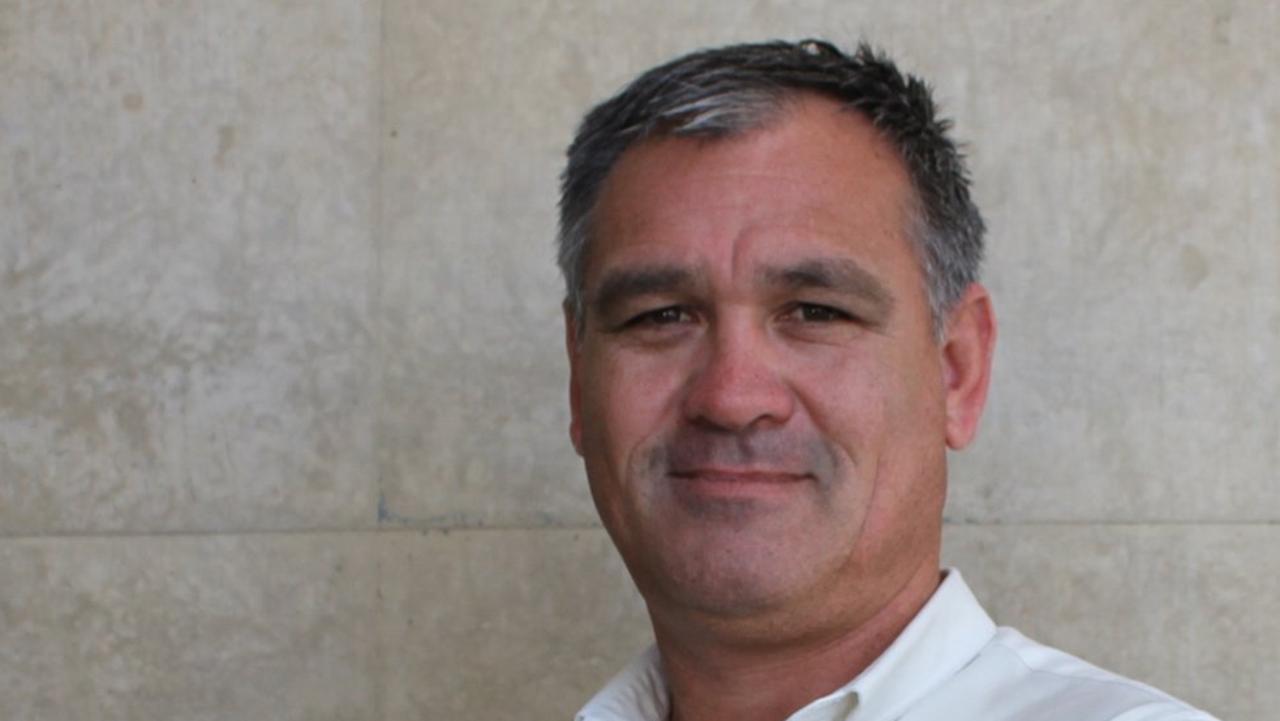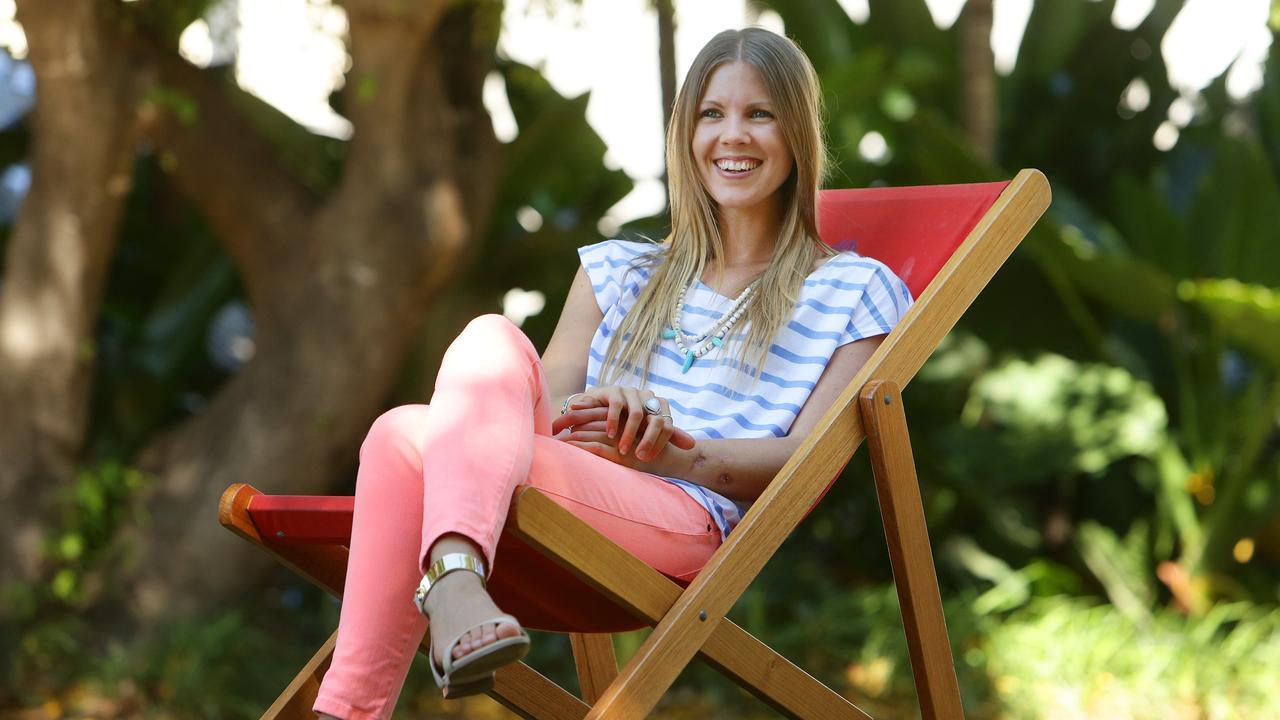George Pell appeal: prosecutors asked why complainant didn’t warn fellow chorister
A judge hearing George Pell’s appeal bid asks why a chorister didn’t warn his friend about being sexually abused twice by the Cardinal.
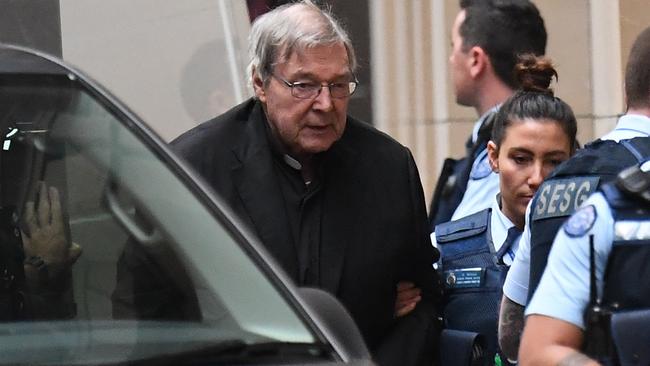
George Pell has beenin Victoria’s Court of Appeal on day two of his bid to overturn sex offence convictions. His legal team, led by Bret Walker, SC, says Pell was wrongly sentenced to six years’ jail for assaulting two choirboys, in 1996 and 1997, in St Patrick’s Cathedral, Melbourne. He is serving a minimum three years, eight months. The main ground of appeal is the claim the jury erred by convicting him.
Here’s how the prosecution, led by Christopher Boyce, QC, today argued that the convictions should stand.
• Judge asks why second boy wasn’t warned by his friend about Pell abuse
Tessa Akerman 4.19pm: Court concludes
The court has reserved its decision. Justice Ferguson thanked counsel for their services.
Pell has been led out of the courtroom to return to the Melbourne Assessment Prison.
Tessa Akerman 3.36pm: Why was video evidence refused?
Mr Boyce quickly went through ground two of the appeal which dealt with the trial judge’s refusal to allow an animation to be shown as part of Pell’s legal team’s closing.
He said the video which purported to show movement of people around the cathedral after mass had a “seductive nature” and was misleading.
There was confusion about whether he agrees with the trial judge’s ruling that the video was evidence and not argument.
Mr Boyce has relied on the prosecution’s written submissions to deal with the third ground concerning whether Pell was arraigned in front of the jury panel as legally required.
Pell’s barrister Bret Walker SC is now back on his feet in reply.
Tessa Akerman 3.31pm: Guilty verdict ‘open to jury’
Summing up Mr Boyce said it was reasonably open to the jury to reach a guilty verdict.
“There’s a rational basis in the evidence to come to the conclusion... upon to convict,” he said.
The judges questioned Mr Boyce about whether jurors had an advantage in being present for the trial instead of having videos, exhibits and transcripts like the court.
Mr Boyce said the jury watched all of the trial unlike the appellate judges.
“If it helps Mr Boyce, I have said previously in judgments that juries almost always get it right,” Justice Weinberg said.
“But the word is almost.”
Tessa Akerman 3.24pm: Corridor push ‘improbable’
Returning from lunch Mr Boyce dealt with the second episode of abuse which involved Pell pushing the chorister against a corridor.
Justice Weinberg said the chorister would have been at the front of the procession.
“To get to him (Pell) would have to get past or move past a whole bunch of choir boys,” he said.
He said it would have been a surprising event with risk and described it as “somewhat improbable.”
John Ferguson 2.27pm: Why make this up?
Justice Weinberg questioned why Pell would have assaulted the claimant in the cathedral a second time.
The jury convicted Pell of this assault, which occurred in 1997.
Weinberg: “It sounds like an improbable thing for the Archbishop to have done.”
Boyce responded: “Why make it up then?”
John Ferguson 2.05pm: Key moment as mood shifts
A concession by the prosecution has swumg courtroom momentum back to George Pell. Read the full analysis here.
Tessa Akerman 1.45pm: Victim’s credibility defended
Cardinal George Pell’s surviving victim has been at the centre of day two of the appeal hearing, as prosecutor Chris Boyce QC defended his credibility.
Pell, 77, is appealing his conviction of one count of sexually penetrating a child under 16 and four counts of indecent act with a child.
The first incident of abuse involved two choristers, one of whom died in 2014 and had denied being abused to his mother.
The second boy, who was also involved in the second episode, gave evidence in Pell’s trial last year.
This morning Mr Boyce described the man as a “very credible witness”. “He’s clearly not a liar, he was not a fantasist,” he said.
He said the three appellate judges could see from the video of the complainant’s evidence that the victim performed well when stressed.
“If it’s a fantasy then you would expect at some point the cracks to appear,” he said.
The abuse involving the two boys took place in the priests’ sacristy at St Patrick’s Cathedral in East Melbourne in December 1996.
Mr Boyce said the man’s account placed the abuse in the middle of the room, possibly within view of the door.
“If he was a liar or a fantasist it would have been so easy just to put it into the alcove area,” Mr Boyce said.
An important part of Pell’s application is that it would not have been physically possible to have exposed his penis to the two boys after Sunday mass when he was in his full robes which included an alb, an ankle-length tunic with no opening down the front, that was tied in place with a cincture and a chasuble, a knee-length over robe, like a poncho.
Mr Boyce said differences in how the man described Pell exposing himself and the logistics could be laid at the recollections of a man remembering what he saw when he was 13.
“You lift it up and to the side,” Mr Boyce said, demonstrating to the court.
Supreme Court Chief Justice Anne Ferguson questioned whether Pell would have been able to move the alb as described.
“Again it’s the memory harking back to a 13-year-old boy in court,” Mr Boyce said.
Justice Mark Weinberg queried how Pell would have been able to keep the garments in place if he had both hands behind the head of one boy during the abuse.
However he said the robes could be bunched up if the archbishop had to go to the bathroom.
Mr Boyce said the cincture tied the alb above the waist, still permitting the alb to be pulled up.
Mr Boyce will continue when the court resumes after lunch before Pell’s barrister Bret Walker SC makes his reply.
John Ferguson 1pm: Question of the robes
The court is now arguing whether or not the sex assaults were possible because of the nature of the garments worn by Pell. It’s accepted it would not have been easy to have assaulted someone wearing layers of clothes. Was it possible to assault the children with these clothes on?
Tessa Akerman 12.30pm: ‘Boys talk, don’t they?’
Mr Boyce has been questioned by the judges about why the complainant didn’t warn the second chorister after he was abused for a second time by Pell.
He said the explanation was “perfectly, credible, very persuasive”.
Judge Chris Maxwell, president of the Court of Appeal, said: “Boys talk, don’t they?”
Mr Boyce agreed they did but said they also wanted to get back to their lives and play footy.
“Boys also want to get on with their lives and they want to get on with playing footy or whatever they want to do,” he said.
Justice Weinberg said it would be a matter for the jury, to which Mr Boyce emphatically agreed.
Mr Boyce went on to say the complainant might not have told anyone about the abuse to protect his parents, his scholarship and that it was embarrassing.
However he said it was quintessentially a matter for the jury to consider.
Mr Boyce said the complainant was “taxed about everything under the sun” in his cross examination by Pell’s defence team, including inconsistencies, and his responses were “absolutely compelling”.
“One of the great old style cross examinations in that regard,” he said. “He dealt with equanimity, patience, things that he got wrong he would concede.”
David King 11.25am: Close call
Mr Boyce mentioned the victim by name in this morning’s hearing, with the 15-second delay in the live stream preventing it from being broadcast.
Under Victorian laws sex assault victims are generally not named.
There are two victims in the case, who were both choirboys when they were abused in the mid 1990s.
One gave evidence in the trial, the other died before the matter came to court. The hearing is being streamed live via the Victorian Supreme Court’s website.
Tessa Akerman 11.05am: Prosecutor ‘fantastic’
Justice Weinberg praises the trial prosecutor, Mark Gibson, QC, for doing a “fantastic job” while saying he could have said Mr Portelli wasn’t a credible witness and asked leave to cross examine him.
“I’m not critical of the prosecutor, I think the prosecutor did a fantastic job,” he said. He also says the defence council did a good job with a “difficult trial”.
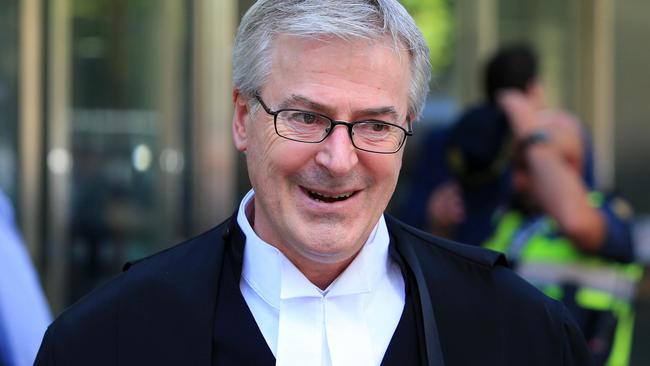
Tessa Akerman 10.55am: ‘His memory was wrong’
Mr Boyce narrowly avoids calling a key witness a liar. He says Monsignor Charles Portelli, who accompanied Pell around the cathedral, had no explicit memories of services at the latter part of 1996.
“The point is when we come to cross examination the memory becomes far more clear,” he said.
Mr Portelli was a key witness in the trial who said he accompanied Pell about St Patrick’s Cathedral and of Pell had to attend a function, he may have left Pell alone for two minutes.
Justice Weinberg asked whether Mr Boyce was saying Mr Portelli was assisting the defence by purporting to have a memory.
“Do you say that’s a falsehood on his part?” He said. Mr Boyce said the re-examination by the prosecutor at trial was “deft”.
“It wasn’t suggested that he lied,” he said. “Clearly suggested his memory was wrong.”
John Ferguson 10.50am: Cardinal’s appearance
Pell seems to be relatively relaxed today, certainly in the context of the committal hearing and the County Court trials.
John Ferguson 10.35am: ‘Some difficulty’ over timing
Mr Boyce concedes that if Pell was on the steps of St Patrick’s Cathedral for 10 minutes after Solemn Mass this would leave the claim that the choirboys were abused in the sacristy “in some difficulty”. This seems to be significant.
John Ferguson 10.30am: Complainant’s evidence discussed
The complainant remains at the centre of the court discussion. Principally, is he a liar, a fantasist or speaking the truth?
Prosecutor Boyce is arguing, somewhat haltingly, that the complainant had never been in the priests’ sacristy. There are two sacristies at St Patrick’s Cathedral.
The complainant’s evidence, as discussed in court, has been that he had not been inside the priests’ sacristy until he was abused by Pell.
There is a great deal of discussion this morning about whether or not he had been in the sacristy before. The judges have watched the video of the complainant talking about the sacristy.
Tessa Akerman 10.15am: Sacristy queries
Mr Boyce is questioned by the judges about the victim’s knowledge of the priests’ sacristy where he was abused.
It was put to the former chorister during the trial that he was taken on a tour of the cathedral when he joined the choir.
The man said he had no memory of a tour but did not dispute it. Justice Mark Weinberg asked whether the lack of positive evidence that the man had previously been in the room amounted to an acknowledgment that it was possible.
“It does seem to amount to me that there’s an acknowledgment that what’s being put to him is right,” Justice Weinberg said.
However, Mr Boyce said there was no positive evidence about a tour.
Remy Varga 9.45am: ‘A witness of truth’
“I don’t fantasise about these things.” was the response given by the complainant when it was put to him that he was a “fantasist” during cross examination at Pell’s trial for child sex offences.
Christopher Boyce, QC, representing the crown, has begun the second day of the Pell’s appeal bid by defending the credibility of the complainant. “The complainant was a very compelling witness,” he said. “He was clearly not a liar, not a fantasist … he was a witness of truth.”
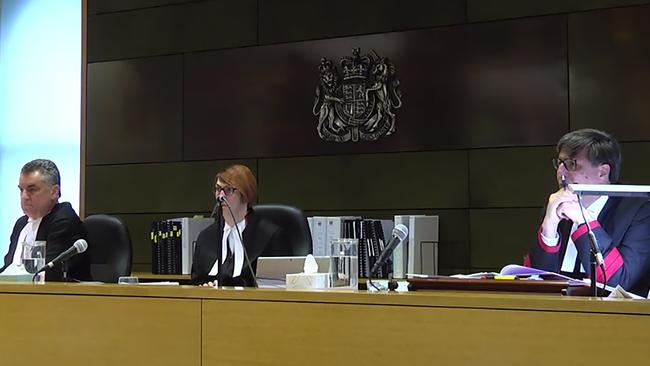
John Ferguson 9.40am: Prosecution opens
Mr Boyce says the complainant clearly wasn’t a liar or a fantasist.
John Ferguson 9.35am: Security tight
George Pell has arrived in court after another major security operation. He nodded towards the front row of the public gallery before being seated. His friend Chris Meaney was in the front row.
John Ferguson 9.30am: Competing camps
This has been a partisan case. Some believe the convictions and some believe in Pell’s innocence. Mark Gibson, QC, will assist Boyce. Gibson’s closing in the County Court was crucial in achieving the Pell convictions.
John Ferguson 9.25am: A simple premise
Yesterday was Bret Walker, SC, for Pell’s big day. Today it will be Christopher Boyce QC’s chance to convince the three judges. The prosecution submission is straightforward enough. Basically it could have happened and it did happen.
John Ferguson 9.10am: Supporters show up again
George Pell’s support group has arrived in court. His close friend Chris Meaney, a prominent Sydney Catholic, has turned up. He has been a constant in Pell’s court appearances. As Pell’s niece Sarah has been. A man, believed to be his brother, also is in court. His long-time adviser Katrina Lee is in court again.
8.30am: Pell back in court
Cardinal Pell has arrived at court for day two of his appeal against sex-abuse convictions.
George Pell arrives for day 2 of his appeal @sunriseon7 @7NewsMelbourne pic.twitter.com/JCVFEGD5Q2
— Nathan Templeton (@nathantemp7) June 5, 2019
Scandal rocked Catholic Church
The prosecution’s successful pursuit of George Pell over the cathedral charges has driven one of the biggest scandals — perhaps the biggest — in the history of the Catholic Church in Australia.
There can be arguments about who has been Australia’s most successful Catholic.
Daniel Mannix, George Pell or Mary MacKillop.
St Mary of the Cross probably has sailed closest to the heavens but for sheer centre-of-the-empire influence, no-one has matched Pell, who rose to become the Vatican’s number three.
Now he is in solitary confinement at the Melbourne Assessment Prison.
Cases outlined
Mobile users can view pdf here
Mobile users can view pdf here
What happens today?
The prosecution, led by Christopher Boyce QC, will seek to dismantle Pell’s appeal. The early consensus is that Pell’s silk, Bret Walker, SC, had a solid day in court yesterday.
I have heard too many predictions from the Catholic camp that have been wrong. So let’s say that Pell is now a 50-50 chance of winning his appeal.
He probably started the appeal process with a 40 per cent chance. This is notwithstanding some considerable questions about the verdicts delivered by the jury.
What’s it all about
Fundamentally, Pell was convicted of multiple sex offences against two teenage choirboys either in or near the priests’ sacristy at St Patrick’s Cathedral in Melbourne.
The core allegations in the lead up to Christmas 1996 are horrific. It includes oral penetration and masturbation of a child.
He was also convicted of a brazen, violent attack on the surviving victim early the following year. The defence argues that it couldn’t have happened in the sacristy because Pell was never alone.
MORE: ‘Jury erred on 13 counts’
ANALYSIS: Legal sharpshooters go head to head
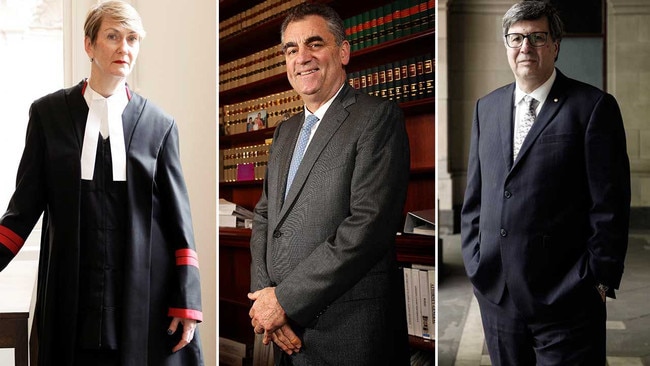
Who to believe?
The surviving victim is seen as being a credible witness but the core allegations are so extreme to have raised a large number of questions.
The prosecution’s response is contained in its 24 page submission to the Court of Appeal. The first ground of appeal — there are three — is essentially the main game.
If it gets up, Pell walks free, at least until, or if, the High Court, gets involved.
The prosecution’s submission on ground one concludes: “Clearly the jury did indeed reject the applicant’s denials and outrage at the allegations. They were entitled to do so if they accepted the evidence of the complainant beyond reasonable doubt.’’
“Likewise, the jury were entitled to reject the hearsay evidence surrounding a denial by a 17 or 18-year-old young man to his mother in response to a question about whether he was abused in the choir.
“Much was made of this by defence. Sadly, an unwillingness by a victim of child sex abuse to disclose to those closest to him is all too familiar. Without speculating, there may be many reasons why a teenager might so deny abuse when questioned by his mother.
“To suggest that it is improbable that these events occurred without two young adolescent male victims who each witnessed sexual abuse perpetuated on the other by an older and revered man, discussing their abuse with each other is a nonsense.
“Simply applying notions of commonsense and their own experiences of the world, the jury was clearly entitled to reject that such discussions must necessarily have taken place if these events occurred.
“The jury were given directions regarding significant forensic disadvantage as a result of the delay. There is nothing to suggest that the jury did not follow those strong directions.
“The jury were entitled to accept the complainant as a reliable and credible witness. He was skilfully cross examined for two days by a very experienced member of Senior Counsel. During that time, the jury had the singular opportunity to observe the complainant as a witness, and to assess the evidence he gave.....’’
“The complainant’s allegations were not improbable when all of the evidence is carefully considered. The jury received the benefit of a direction regarding an honest but erroneous memory. There is nothing in the jury’s verdicts to suggest that they did not follow this clear direction of law.
“When looking at the whole of the evidence, the integrity of the jury’s verdicts is unimpeachable.’’
But surely there is more?
And there is.
The defence threw up witness after witness that questioned the plausibility of the attacks.
But evidence was given that gave, I suppose, partial support that an attack of this kind was possible.
This is where the defence strategy in the County Court became of interest. The defence stressed that attacks of this kind were impossible. No-one can say for certain the attacks didn’t occur, but can they say they occurred beyond reasonable doubt?
That us the challenge facing the Court of Appeal.


